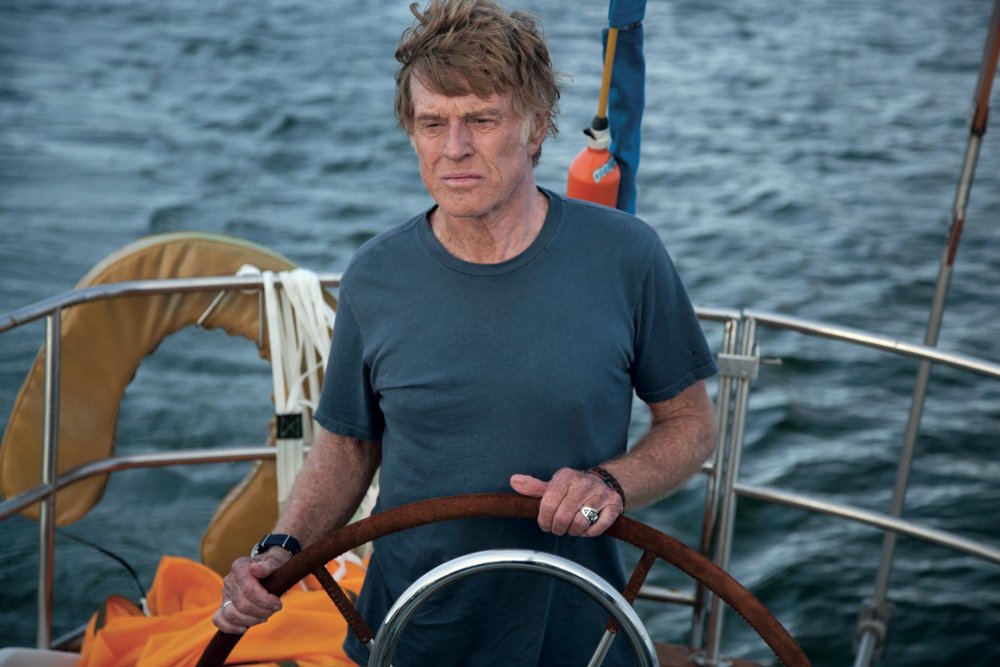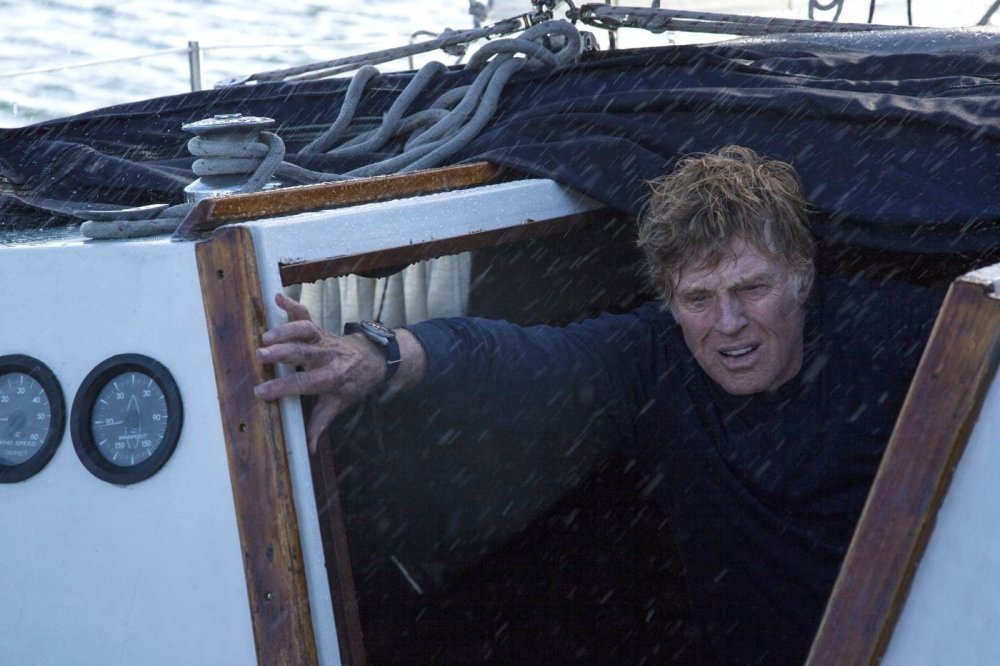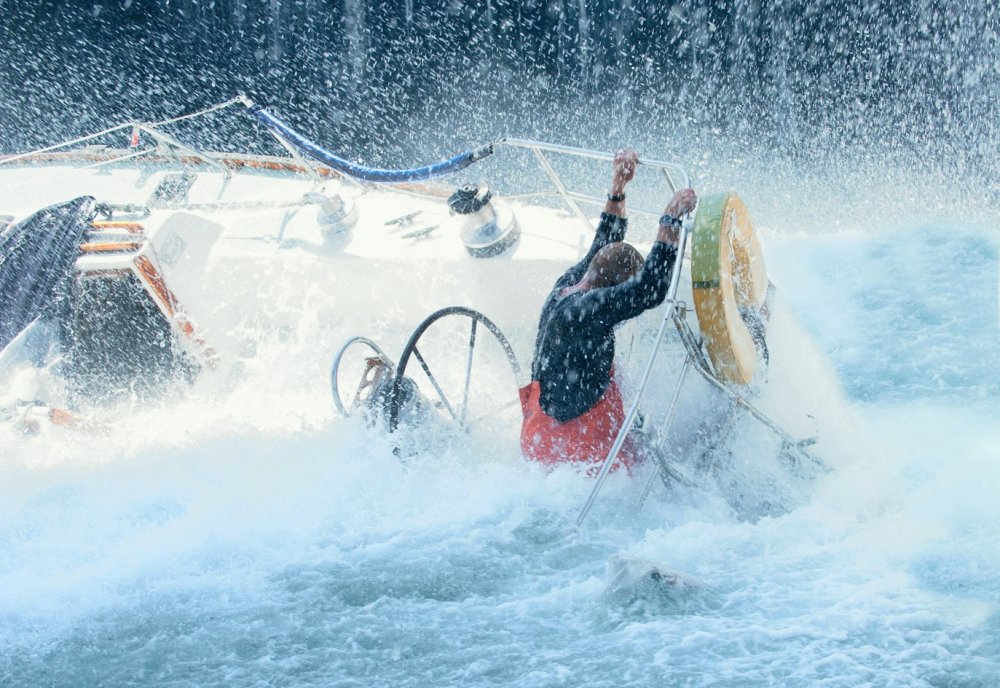Web exclusive

All Is Lost (2013)
‘Stripped down’ is overused as a term of affection in film criticism. It can be applied evenly to films that take a barebones approach to narrative and performances deemed raw – the old less-is-more argument as an ultimate aesthetic and narrative goal. The term always seems woefully insufficient, whether attributed to an ascetic Bruno Dumont experiment or a major Hollywood spectacle like Gravity.
Canada / USA 2013
Certificate 12A 106m 0s
Crew
Director J.C. Chandor
Produced by Neal Dodson, Anna Gerb, Justin Nappi, Teddy Schwarzman
Written by J.C. Chandor
Director of Photography Frank Demarco
Visual Effects Supervisor Bob Munroe
Editor Pete Beaudreau
Music Alexis Ebert
Cast
Cast member Robert Redford
UK distributor Universal Pictures
UK release date 26 December 2014
The latest entertainment to beggar such description, All Is Lost is even higher concept in its narrow breadth: a solitary man (played by none other than that monolith of rugged American masculinity, Robert Redford) battles the elements in the middle of the Indian Ocean. He is unnamed. With very rare exceptions, he does not speak. We learn nothing of his past. Our eyes may scan the interior of his boat for telltale signs of a family waiting back home but there is nary a photograph.
The entirety of the film consists of him trying to stay afloat, whether on yacht or life raft. There’s no painted volleyball (Cast Away), CG tiger (Life of Pi) or smarmy Clooney-bot (Gravity) for him to communicate fears to or bounce survival ideas off. Nevertheless, All Is Lost is as rigorously sustained and bountifully cinematic as any recent American movie, filled with more tenable emotion and relatable incident than ten Cloud Atlases.

All Is Lost (2013)
The film is a surprising sophomore feature for the incredibly well-connected J.C. Chandor, whose debut, 2011’s Margin Call, was a dialogue and character-driven fictionalisation of the financial crisis of the noughties from the aggrieved point of view of a group of investment bankers. Lousy with A-listers (Kevin Spacey! Demi Moore! Jeremy Irons!) and overstuffed with hand-wringing and psychologising, Margin Call would hardly seem to point towards the old-man-and-the-sea narrative of All Is Lost.
Yet they are both in fact heavily plotted tales of men doing their damnedest to avert inevitable disaster. At one point in All Is Lost, our hero swings on a rope near the top of his boat’s mast and the camera swings ever so slightly to the left to reveal a mass of ominous forming storm clouds, a powerful image that might stand in for the entirety of Chandor’s previous film.
Considering Margin Call, one might be tempted to assign a self-lacerating liberal message to All Is Lost, as our man in the east is conspicuously Caucasian, and clearly completely out of his element. Yet for all its gestures towards the political, the film functions best as a pummelling adventure; it’s even less mythic than practical, more Daniel Defoe than Ernest Hemingway.
It helps that our quiet American is played by Redford, an actor who frequently comes across as icy and overly self-sufficient with co-stars, but who is fleet, physical and all business when sharing the screen with no one. Despite a handful of stagy, camera-ready reaction shots, it’s an impressive performance, if mostly for its sheer stamina: rarely do we see a Hollywood icon get so abused on screen, let alone one whose career has been known for its smooth forward motion from improbably handsome movie star to respected director to independent-film demigod. There’s an undeniable charge in witnessing the 77-year-old golden boy get willingly bruised and battered, but All Is Lost so effectively courts audience empathy with this solitary figure that his continual resilience is ultimately the film’s greatest pleasure.

All Is Lost (2013)
It’s surely not difficult to see that existential-minded horror films like All Is Lost and Gravity are side effects of a plugged-in age, serving as reminders of our essential fragility and aloneness despite the perceived safety net afforded by technology. Like that of Gravity, All Is Lost’s narrative only commences when communication has broken down, sentencing our protagonist to possible death. Chandor might have betrayed a bit more Schadenfreude towards his main character, but aside from a single, barely glimpsed can of organic beans and one drowned laptop, the writer-director doesn’t give us any reason to view our man as a piece of hopelessly 21st-century flotsam. There’s nothing hectoring about Chandor’s film. Redford is allowed to be elemental rather than metaphorical, a desperate Mr Fix-It.
Chandor, aided by muscular but never showy cinematography by Frank G. DeMarco and Peter Zuccarini, stays close to the star, viewing him with curious watchfulness and accompanying him as he comes face to face with mortality. The film attains an operatic grandeur in its closing moments, and surprisingly earns it: Chandor’s intensely physical, experiential work has brought us right up to the perilous edge between life and death.
Also in our January 2014 issue
The old man and the sea
Robert Redford’s intense, elemental performance in J.C. Chandor’s exceptional survival drama All Is Lost sees the actor turn his back on his screen persona to portray an ordinary man facing extraordinary challenges. By David Thomson.
-
Sight & Sound: the January 2014 issue

In our January issue: The best films of the year, plus Spike Jonze’s computer romance, Bong Joonho versus Harvey Weinstein and Alexander...
-
The Digital Edition and Archive quick link
Log in here to your digital edition and archive subscription, take a look at the packages on offer and buy a subscription.









